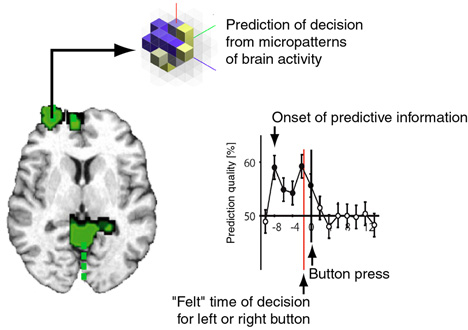According to a much bally-hooed study, “Certain patterns of brain activity predict people’s decisions up to 10 seconds before the people are aware of them, according to new research that casts fresh doubt on whether we have free will.”

This seems to me an extraordinarily bad argument, a case of ignoratio elenchi (the fallacy of attempting to refute a position without first ascertaining what the position to be refuted actually says).
First, the study assumes without argument that the correct theory of free will is incompatibilism rather than compatibilism. Obviously if compatibilism is correct then the existence of causally sufficient conditions antecedent to one’s choices is no obstacle to those choices’ being free. (And most philosophers will agree that if we turned out not to have incompatibilist free will, then incompatibilism rather than free will would be the thing to reject.)
Second, even if (as I think) the correct theory of free will is incompatibilist, I can’t see that this study poses any obstacle even to incompatibilist free will. For it seems to assume two dubious things.
First, it assumes that if the preparatory brain activity precedes consciousness of the choice, then the preparatory brain activity must therefore also precede the choice itself. I can’t see what warrants that assumption. Choices aren’t instantaneous, they’re processes that take time; and awareness of the choice seems likely to come later rather than earlier in the process.
Second, even if we assume (unwarrantedly) that the preparatory activity does precede the choice itself, that still doesn’t show that the choice is causally determined by antecedent circumstances. All that it shows is that the choice is made extremely probable by antecedent circumstances; and the incompatibilist libertarian need have no objection to that. After all, given quantum physics, and given that we’re made of matter that’s governed by quantum physics, we already know that nobody’s choices are causally determined by antecedent circumstances (unless this study is claiming to have falsified quantum physics, which would be a wee bit ambitious).
This study illustrates the perils of scientists trying to draw conclusions about a philosophical topic without knowing very much philosophy ….